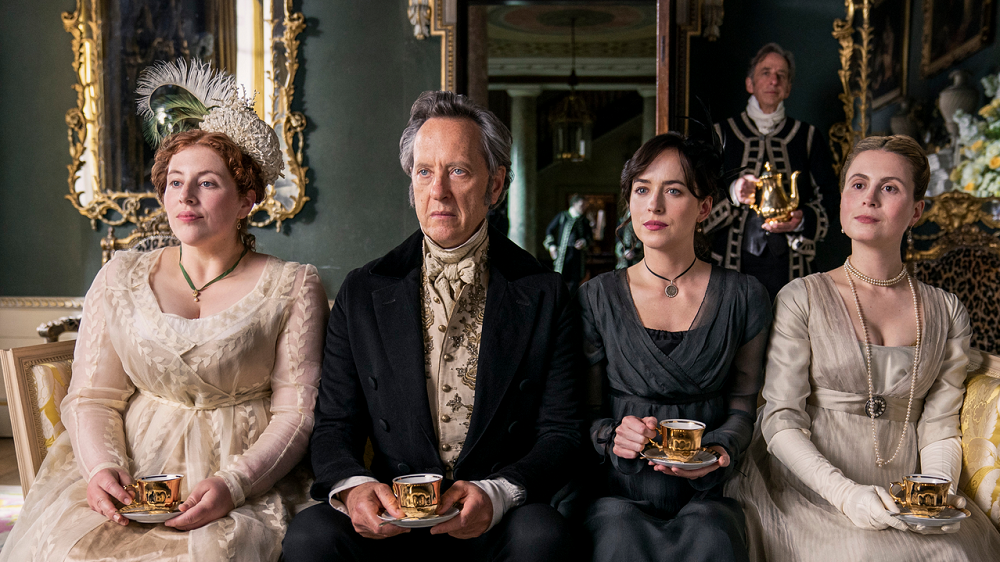From The New York Times:
The great irony of this new, not-quite-modernized adaptation of Jane Austen’s final novel, “Persuasion,” is that it communicates its tense relationship to its 19th-century source material in a repressed, passive-aggressive manner — an approach oddly suited to Austen’s trenchant view of society. The film doesn’t take the creative leap to transpose the beloved story in the present day. Instead, in curiously excruciating fashion, the director, screenwriters, and star imply their discomfort with Georgian-era social norms from within the novel’s period setting.
Both the film and the novel begin in the early 1800s, as the story’s heroine, Anne Elliot (Dakota Johnson), visits her sister Mary (Mia McKenna-Bruce) in the English countryside, after their father squandered the family savings. Anne is an unmarried woman who is fortunate to be respected — or, at least, perceived as useful — by her blue-blooded relations. But in direct addresses to the camera, Anne admits that she is haunted by the memory of a love affair she was persuaded to end with an enterprising but fortuneless sailor, Frederick Wentworth (Cosmo Jarvis).
Now Anne is alone, and her regrets only grow when Wentworth returns to the country as a wealthy naval captain. He’s eager to find a wife, and if his sights are first set on Anne’s lively sister-in-law Louisa (Nia Towle), his attention always seems to wander back to Anne.
For this story of rekindled romance, the film summons the handsome appointments expected for a big-budget period drama. There are extravagant mansions, brocaded costumes and magnificent vistas. But there is a crisis of contemporaneity at the heart of this pretty adaptation, and the trouble begins with its presentation of its heroine.
Johnson, wearing smoky eye shadow and pink lipstick, displays the confident appeal of a celebrity sharing her secrets with the audience. Her smile reads as a smirk. The incongruous bravado of her performance is mirrored by the film’s script, written by Ron Bass and Alice Victoria Winslow, which peppers lines from the novel with meme-ish truisms like, “Now we are worse than exes. We’re friends.” (Read more.)
From Literary Hub:
A single woman is drinking alone, crying over a man. She’s probably pining for her lost girlhood, the spotlight glow of youth and the gazes that gravitate to a girl bathing in it. These days, she’s sobbing in a bathtub, wallowing in her romantic regrets. Luckily, she still has her incisive eye and sarcastic tongue. Narrating in voiceover, our heroine begins telling us her romantic history, why she’s crying, and we’re meant to laugh.
This description could apply equally to the opening sequences of 2001’s Bridget Jones’ Diary and Netflix’s Persuasion, the latest film adaptation of Jane Austen’s novel by the same name. Like Bridget Jones, Persuasion’s protagonist Anne Elliot is as witty as she is weepy, and just as rife with romantic yearning. But where Bridget Jones’ narration mixes self-loathing with earnest expressions of hope, this iteration of Anne Elliot cuts her self-recriminations with eyerolls, winks, and witticisms, alongside harsh judgments of everyone around her, save the object of her affection—and instead of limiting her audience interactions to voiceover, Anne Elliot makes direct eye contact with us throughout the film, hitting us with saucy stares and raised eyebrows. This artistic approach to telling a woman’s story is more aligned with the ethos of Fleabag than Bridget Jones, a fact the internet picked up on and began picking apart as soon as the film’s trailer was released.
Tweets like “Persuasion is in its Fleabag era and I do not like it” and “did they just…Fleabaged Persuasion?” quickly racked up likes and retweets. Early reviewers concurred, with Mashable’s Kristy Pushko calling Johnson’s Anne Elliot “a fleabagged haughty hottie.” The initial backlash centered on the fact that of all the Austen novels ripe for the Fleabag treatment, Persuasion perhaps makes the least sense. Austen’s final completed novel, published after her death, Persuasion follows its single 28-year-old protagonist as she faces her sorrow and loneliness head on, while exhibiting forbearance, grace, and dignity in front of family, friends, acquaintances, and even her ex-lover.
For the bulk of the book, Anne is a woman in yearning, prone to solitary walks and pessimistic ruminations about her future, but she is also a woman confident in her intelligence and competence, a woman who treats those around her with an almost astonishing level of care and kindness, especially in the face of her own family’s dismissiveness in light of her impending spinster status. What she is not is a judgmental jokester, or a self-hating sarcasm machine. (Read more.)



















No comments:
Post a Comment